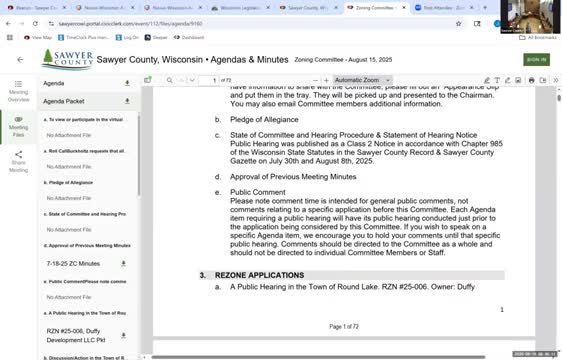Round Lake Town Board Denies Special Use Permit for Residential Structure on Agricultural Lot
August 16, 2025 | Sawyer County, Wisconsin
Thanks to Scribe from Workplace AI , all articles about Wisconsin are free for you to enjoy throughout 2025!

This article was created by AI using a video recording of the meeting. It summarizes the key points discussed, but for full details and context, please refer to the video of the full meeting. Link to Full Meeting
The meeting kicked off with concerns raised about a specific agricultural lot, less than five acres in size, which had been granted a special use permit instead of undergoing a rezone process. Local resident Ginny expressed her apprehension, emphasizing the importance of adhering to zoning laws to ensure orderly development. “We want to make sure that we're doing all of our zoning correctly,” she stated, highlighting the need for a thorough review of similar parcels that might also be out of compliance.
Linda Zollmer, a property owner in the area, echoed these sentiments, advocating for a clearer understanding of the zoning process. She pointed out that every stakeholder, from applicants to neighbors, plays a crucial role in shaping zoning ordinances. “It’s not just to check the box,” she remarked, stressing the importance of minimizing conflicts and maximizing efficiency in public services.
The focal point of the meeting was a rezone application from Dupper Eave Development LLC, seeking to convert a nearly one-acre agricultural lot into a residential zone to build a home. The town board had initially hesitated to approve a special use permit due to the lot's substandard size, which is below the five-acre minimum for agricultural zoning. The board eventually approved the permit but conditioned it on the applicant pursuing a rezone.
As the public hearing unfolded, opinions diverged. While the town board recommended approval of the rezone, citing benefits for planned land use and family life, residents like Zollmer raised concerns about the potential for conflict between residential and agricultural uses. “You’re going to have a residential parcel in the middle of agriculture, which in the future can set up a conflict for those agricultural uses,” she warned, advocating for the denial of the rezone in favor of a special use permit that would maintain the agricultural designation.
The meeting concluded with a motion to exit the public hearing, leaving the future of the rezone application uncertain. As the community grapples with these zoning challenges, the discussions reflect a broader struggle to balance development with the preservation of agricultural integrity in Sawyer County. The outcome of this rezone could set a precedent for how similar cases are handled in the future, making it a pivotal moment for local land use policy.
Converted from Zoning 2025 08 15 meeting on August 16, 2025
Link to Full Meeting
Comments
View full meeting
This article is based on a recent meeting—watch the full video and explore the complete transcript for deeper insights into the discussion.
View full meeting
